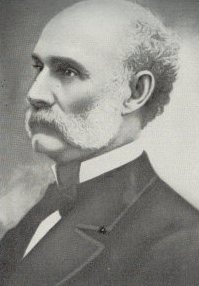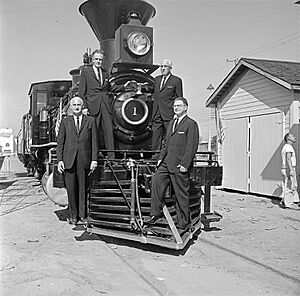Cyrus K. Holliday facts for kids
Quick facts for kids
Cyrus K. Holliday
|
|
|---|---|
 |
|
| Mayor of Topeka | |
| In office 1869–1870 |
|
| Preceded by | Orin T. Welch |
| Succeeded by | Rev. J. B. McAfee |
| In office 1867–1868 |
|
| Preceded by | Ross Burns |
| Succeeded by | Orin T. Welch |
| In office 1859–1860 |
|
| Preceded by | Lorenzo Dow |
| Succeeded by | Hiram W. Farnsworth |
| Personal details | |
| Born |
Cyrus Kurtz Holliday
April 3, 1826 Kidderminster, Pennsylvania, U.S. |
| Died | March 29, 1900 (aged 73) Topeka, Kansas, U.S. |
| Spouse | Mary Dillon Jones |
| Children | Lillie Holliday Charles King Holliday |
| Parents | David Holliday Mary (Kennedy) Holliday |
| Occupation | Railroad executive |
Cyrus Kurtz Holliday (born April 3, 1826 – died March 29, 1900) was an important American businessman. He helped found the city of Topeka, Kansas, in the mid-1800s. He also served as the Adjutant General of Kansas during the American Civil War. His title, Colonel, was an honorary one, not from actual combat.
Holliday was the first president of the Atchison, Topeka and Santa Fe Railway. He was also one of the railroad's directors for almost 40 years. Many railway engines were named after him, as was the former town of Holliday, Kansas. He was also a leader in the Freemason group in Kansas. His influence helped move the Kansas State Capitol to Topeka.
Contents
Early Life and Education
Cyrus K. Holliday was born on April 3, 1826. His parents were David and Mary Holliday. He was born in Kidderminster, Pennsylvania, near Carlisle. He went to public school and later studied law. In 1852, he graduated from Allegheny College in Meadville, Pennsylvania. Even though he moved to Kansas in 1854, he received a master's degree from Allegheny College in 1855.
While in Meadville, he helped create legal papers for a new railroad. This railroad would connect to a larger system. Holliday saw a great opportunity. Instead of just a fee, he asked for a partnership in the new railroad. When a bigger company bought this railroad, Holliday earned a good amount of money from the sale.
After this success, he married Mary Dillon Jones. Many people were moving west to settle new lands. Holliday soon followed them to Kansas. Mary stayed in Pennsylvania at first. They later reunited in Kansas. Their children, Lillie and Charles King, were born before they moved to Kansas.
Founding Topeka and Public Service
In 1854, Holliday moved to Kansas. He first settled in Lawrence in October of that year. His wife, Mary, joined him later.
In 1855, Holliday earned the honorary title of Colonel. This was for supervising a group of soldiers during the Wakarusa War. He also served as the Adjutant General of Kansas. This was during the American Civil War, from May 1864 to March 1865. Even though his Colonel title was honorary, he used it for many years.
In 1861, Holliday became a member of the Kansas State Senate. He was a member of the Republican Party. In 1874, he ran for Congress but did not win.
Holliday was very interested in developing Kansas's natural resources. In the 1890s, he believed that parts of central Kansas had valuable minerals. These included tin, zinc, and gold. In 1899, his son, Charles K. Holliday, founded a town called Smoky Hill City, Kansas. This town was near where the minerals were thought to be.
Building the Santa Fe Railroad
Once Topeka was founded, it needed ways to connect to other parts of the country. Holliday's legal skills were needed again. He wrote the official document to create a new railroad in 1859. This railroad was called the Atchison and Topeka Railroad Company. It would connect the two cities by following the path of the Santa Fe Trail.
Kansas Territory Governor Samuel Medary approved this plan on February 11, 1859. Holliday was chosen as a director and president of the new railroad. This happened on September 17, 1860. In 1863, the railroad's name changed to the Atchison, Topeka and Santa Fe Railway.
As president, Holliday helped the railroad get land from the government. This land was used to help people settle in western Kansas. More settlers meant more customers for the railroad. He stepped down as president at the end of 1863. However, he stayed on the board of directors until July 1865. He rejoined the board in September 1868. He served on the board until his death in March 1900.
Legacy and Recognition
Cyrus K. Holliday is buried in Topeka Cemetery in Topeka, Kansas. He is remembered for his important work in Kansas and with the Santa Fe Railway:
- The first locomotive of the Atchison, Topeka, & Santa Fe Railway was named Cyrus K. Holliday. This historic engine was displayed until the 1960s. It is now kept at the Kansas History Museum.
- In a 1940 movie called "Santa Fe Trail", an actor played him. The movie showed him as someone who helped trade and development in the American West.
- A ship was named in his honor: In World War II, the United States liberty ship SS Cyrus K. Holliday was named in his honor..
- The first locomotive on the Disneyland Railroad in California is named "C.K. Holliday". It has had this name since the park opened in 1955.
- Locomotive #2 of the Disneyland Railroad in France is also named "C.K. Holliday".
- In 1960, he was added to the Hall of Great Westerners. This is at the National Cowboy & Western Heritage Museum.
- The Cyrus Hotel in Topeka, Kansas, which opened in 2019, was named to honor him.
See also
 In Spanish: Cyrus K. Holliday para niños
In Spanish: Cyrus K. Holliday para niños
 | Tommie Smith |
 | Simone Manuel |
 | Shani Davis |
 | Simone Biles |
 | Alice Coachman |


